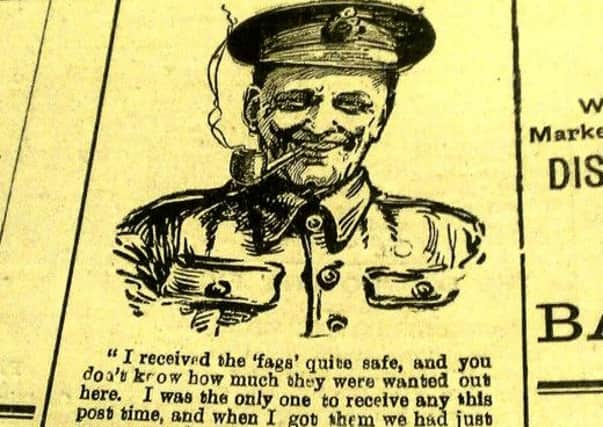Ballymena 1914: You’re in the army now


He was distrustful of the Territorials and was convinced that the only way forward was to raise ‘service’ battalions which would exist for the duration of the war.
Kitchener, the epitome of the Imperial soldier, was soon staring down from walls and hoardings across the British Isles. His eyes, according to veterans, seemed to follow them at every angle. And his finger pointed directly at their patriotic souls, pressing home the poster’s simple message: ‘Your Country Needs You.’
Advertisement
Hide AdAdvertisement
Hide AdIn England, Scotland and Wales this appeal brought forth thousands upon thousands of eager volunteers. They were the men of K1 ‘The First Hundred Thousand’ … it was an indication of the strength of patriotic feeling at the time. Today, it can be dismissed as jingoism at worst and naivete at best.
But this response cannot be ignored for the simple reason that it seems to confirm the historical judgement that, for many, it was the most popular war in history.
As always, things were ‘different’ in Ireland.
Some ignored political considerations and simply rushed to the nearest recruiting office to join up. In the main, these first-come, first served volunteers found themselves incorporated into the battalions which were to form the 10th (Irish) Division.
A mixture of catholics and protestants from Ballymena found themselves swept up in this rush and most of them were soon badged as soldiers of the 6th (Service) battalion of the Royal Irish Rifles. Irish military historians have argued that the 6th Rifles deserve the honour of being described as the least ‘political’ of the volunteer formations raised in Ireland during the Great War.
Advertisement
Hide AdAdvertisement
Hide AdUVF men mixed with national volunteers, Orangemen with devout catholics, ‘corner boys’ with well-to-do tradesmen.
They were drawn by a sense of adventure, a thirst for excitement and a desire to prove themselves as fighting men. And, of course, for many it was a wage with good allowances for those with dependants left to keep the home fires burning.
But Kitchener had his eyes on a bigger prize.
He was well aware of the manpower and skills which existed in the ranks of the Ulster Volunteers, the pro-union armed force created by Sir Edward Carson.
While the UVF was obviously not up to the high standards of the regular British army, it was, nevertheless, a martial formation, trained in drill, small arms and with a modicum of military discipline – although there were exceptions to that broad description.
Advertisement
Hide AdAdvertisement
Hide AdHe was also keen to have those members of the pro-home rule National Volunteers in the ranks of the British army.Political overtures were made to Carson and also to Redmond, the nationalist leader, and it was announced that any movement on the issue of home rule would be postponed until the end of hostilities.
With this hurdle cleared, both Carson and Redmond called on ‘their’ men to take the King’s shilling.
For Carson and the UVF it was a sign of their loyalty to the crown, an indication of their overwhelming desire to be identified with the Empire and Great Britain.
Redmond had to walk a precarious tightrope. He made it clear that those national volunteers who served in the British army would be fighting, not for Britain and her Empire, but for the rights of small nations to self determination.
Advertisement
Hide AdAdvertisement
Hide AdIn Ballymena, the men of the 1st battalion, North Antrim Regiment of the UVF, responded to their leader’s call with a will.
In the third week of September, the meeting room of the Protestant Hall was packed with local UVF men eager to join the fight against the Kaiser. Soon more than half of the 12th (service) Bn. of the Royal Irish Rifles was made up of men, and boys in some cases, from Ballymena and District. Around 300 men enlisted on that one day with many others, for a variety of reasons, travelling to Belfast recruiting offices.
They had been designated as the ‘Central Antrim Volunteers’, allocated to 108 Infantry Brigade and throughout the war, the battalion was to maintain this close association with the town and its surrounding villages and farms.